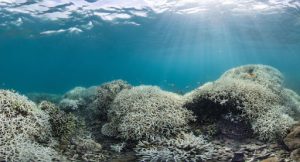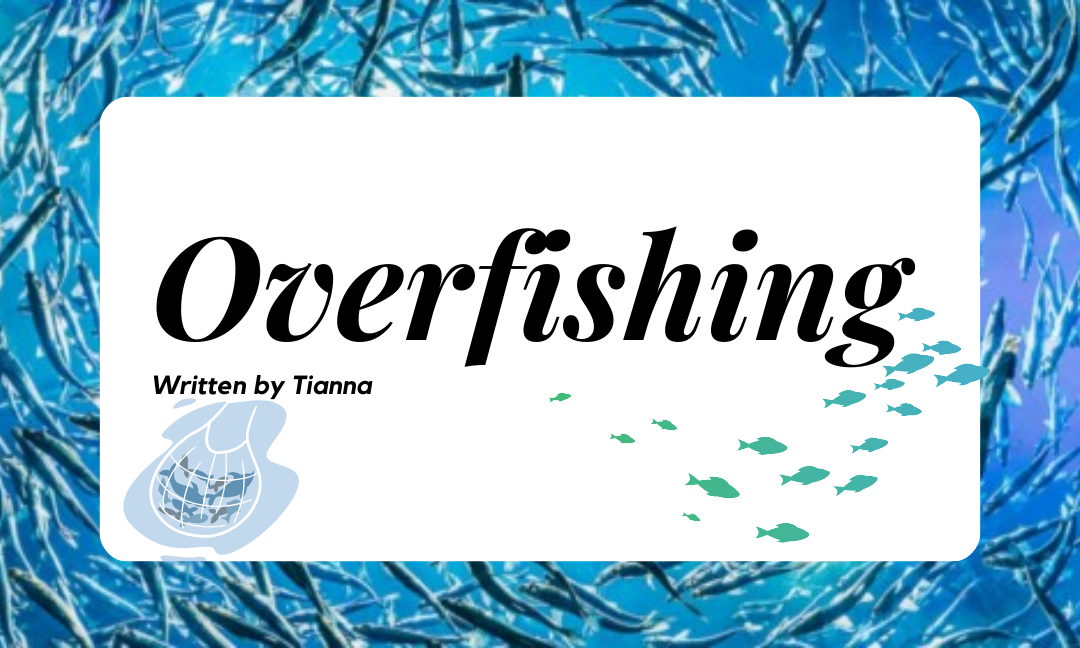Written By: Tianna
Edited By: Ravjyot Ughra
Designed By: Cece Ndiwa
Published By: Miriam Alonge Wato
Too Many People, Not Enough Fish: The Effects of Overfishing
Surf n’ turf, coconut shrimp, fresh sushi, pescatarian diets: most people can’t say no to some good seafood, but there have been several detrimental effects to our ecosystems due to overfishing.
What is overfishing?
Overfishing is the act of catching too many fish at once to the point that it throws off the balance of ecosystems. Overfishing can be associated with many things such as:
- Commercial fishing
- The harvesting of fish for barter, trade, or sale
- Companies hauling in large amounts of fish for sale
- Bycatch
- The unintended catch of marine life (such as sharks, turtles, and dolphins)
What causes overfishing?
There are many causes for overfishing, the main one being poor fishery management. Many fisheries lack the proper rules to keep marine life safe. They are often governed by rules that make the problem worse, or they lack rules altogether. There is also a lack of protective regulations on our oceans and marine life. Without protective regulations, there are no consequences to our environment being harmed. Both of these combined means that ecosystems are being destroyed left and right. Along with, increasing human demand has caused a spike in overfishing. Since there are more people who want fish, there are more fish being caught.
Where is overfishing most prevalent?
Overfishing is an issue all over the world. Many places such as the Arctic, Coastal East Africa, the coral triangle, the Gulf of California, and the Galápagos face the adverse effects of overfishing. The main species being overfished is tuna (albacore, bigeye, bluefin, and skipjack). Sadly, because of bycatch, many other species get caught in the nets and suffer the effects of unregulated fishing.

Image from: Albacore Tuna: What to know, when & where to get it — Monterey Bay Fisheries Trust
What are the effects of overfishing?
Because of so many fish leaving the area at one time, the breeding population becomes so depleted it is unable to properly recover. This means that we are taking too many fish out at once, hindering repopulating and causing species to face extinction. This endangers not only the species but the surrounding ecosystems that rely on everything being in a state of balance.
There is a fishing technique called bottom dragging, where a net is released and dragged on the ocean floor. Bottom dragging wrecks sponged, coral, and any other species that provide habitats for local marine life. Not only does overfishing kill hundreds to thousands of fish to be sold commercially, it also kills anything left by completely destroying the surrounding environment.
Did you know that 55% percent of the world’s reefs are affected by overfishing? And when the fish population declines, algae begins to grow and suffocate any surviving corals. Overfishing is one of the main reasons a lot of our marine life face’s extinction. Approximately 50 million sharks a year get killed because of being victims of bycatch. In the U.S alone 4,600 sea turtles are captured, killed, or injured yearly by fishing industries. In the Atlantic over 10,000 dolphins suffer the effects of bycatch and get injured or killed. Also, fishing nets are one of the top polluters in our oceans and scientists predict that around 90% of the world’s coral reefs will be dead by 2050. These statistics are only a handful of what happens with overfishing. Our marine life faces extinction if we don’t try to reverse this.

Image: Coral Bleaching – Great Barrier Reef Foundation
How can overfishing be reduced (and hopefully stopped)?
As of right now, spreading awareness on overfishing is the best thing an individual can do. Overfishing is a topic everyone kind of knows about but also isn’t necessarily aware of how much the problem has increased. By telling people about overfishing, bigger action can be taken. Regulating fisheries, holding them accountable, and advocating for fishing rights and marine life protection will be the biggest driver in stopping overfishing. Right now fisheries have little to no rules. Signing petitions, educating those you know who fish, and donating to marine protection foundations can potentially help save our marine life. Also, eating alternatives to sea life will help. By reducing the demand for seafood, overfishing is bound to decrease. There are many plant based alternatives that are better for the environment and taste just as good! So don’t forget what you learned in this article, spread the awareness of overfishing, and together hopefully the fisheries can fix the destruction they caused.
_______________
Works Cited
Otto, Calen. “What Are the Causes of Overfishing and How Does It Affect the Environment?” Sentient Media, 29 October 2021, https://sentientmedia.org/how-does-overfishing-affect-the-environment/. Accessed 7 January 2023.
“Overfishing: The most serious threat to our oceans.” Environmental Defense Fund, https://www.edf.org/oceans/overfishing-most-serious-threat-our-oceans. Accessed 7 January 2023.
“UN alert: Mediterranean is world’s most overfished sea.” Oceana Europe, 9 July 2018, https://europe.oceana.org/press-releases/un-alert-mediterranean-worlds-most-overfished-sea/. Accessed 7 January 2023.
“What is Overfishing? Facts, Effects and Overfishing Solutions.” World Wildlife Fund, https://www.worldwildlife.org/threats/overfishing. Accessed 7 January 2023.

